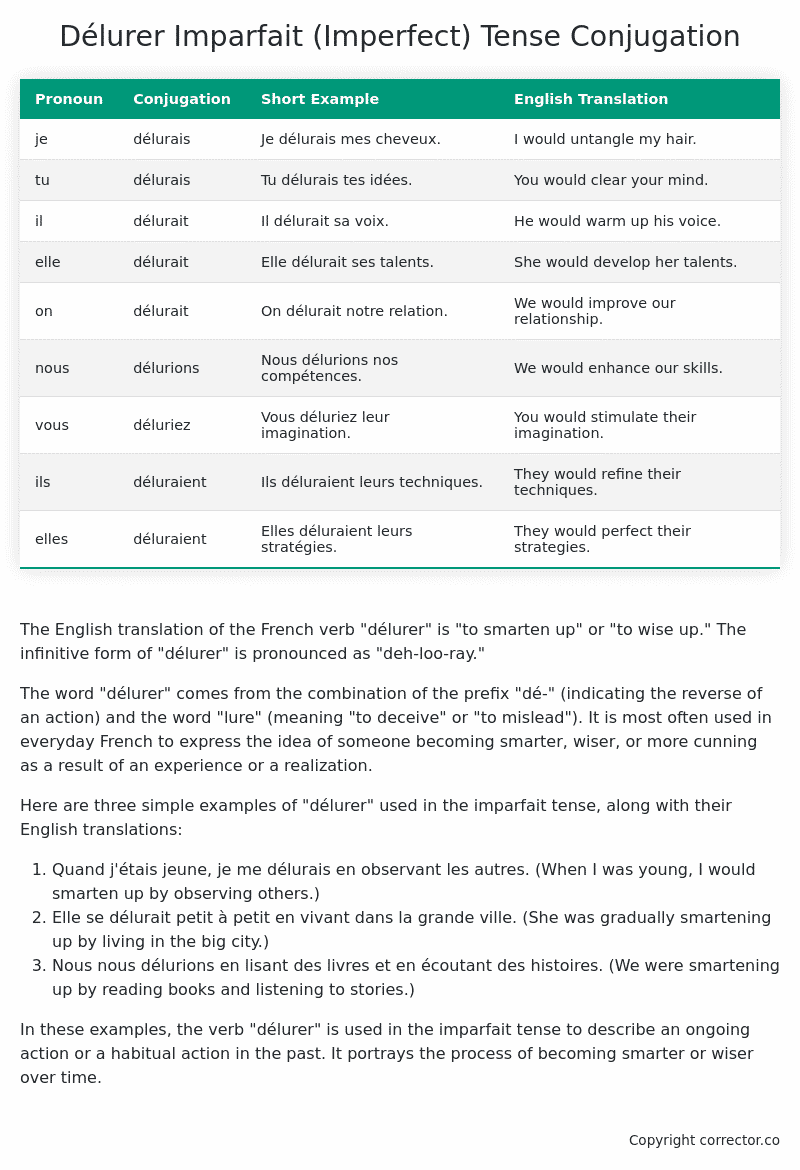Imparfait (Imperfect) Tense Conjugation of the French Verb délurer
Introduction to the verb délurer
The English translation of the French verb “délurer” is “to smarten up” or “to wise up.” The infinitive form of “délurer” is pronounced as “deh-loo-ray.”
The word “délurer” comes from the combination of the prefix “dé-” (indicating the reverse of an action) and the word “lure” (meaning “to deceive” or “to mislead”). It is most often used in everyday French to express the idea of someone becoming smarter, wiser, or more cunning as a result of an experience or a realization.
Here are three simple examples of “délurer” used in the imparfait tense, along with their English translations:
- Quand j’étais jeune, je me délurais en observant les autres. (When I was young, I would smarten up by observing others.)
- Elle se délurait petit à petit en vivant dans la grande ville. (She was gradually smartening up by living in the big city.)
- Nous nous délurions en lisant des livres et en écoutant des histoires. (We were smartening up by reading books and listening to stories.)
In these examples, the verb “délurer” is used in the imparfait tense to describe an ongoing action or a habitual action in the past. It portrays the process of becoming smarter or wiser over time.
Table of the Imparfait (Imperfect) Tense Conjugation of délurer
| Pronoun | Conjugation | Short Example | English Translation |
|---|---|---|---|
| je | délurais | Je délurais mes cheveux. | I would untangle my hair. |
| tu | délurais | Tu délurais tes idées. | You would clear your mind. |
| il | délurait | Il délurait sa voix. | He would warm up his voice. |
| elle | délurait | Elle délurait ses talents. | She would develop her talents. |
| on | délurait | On délurait notre relation. | We would improve our relationship. |
| nous | délurions | Nous délurions nos compétences. | We would enhance our skills. |
| vous | déluriez | Vous déluriez leur imagination. | You would stimulate their imagination. |
| ils | déluraient | Ils déluraient leurs techniques. | They would refine their techniques. |
| elles | déluraient | Elles déluraient leurs stratégies. | They would perfect their strategies. |
Other Conjugations for Délurer.
Le Present (Present Tense) Conjugation of the French Verb délurer
Imparfait (Imperfect) Tense Conjugation of the French Verb délurer (You’re reading it right now!)
Passé Simple (Simple Past) Tense Conjugation of the French Verb délurer
Passé Composé (Present Perfect) Tense Conjugation of the French Verb délurer
Futur Simple (Simple Future) Tense Conjugation of the French Verb délurer
Futur Proche (Near Future) Tense Conjugation of the French Verb délurer
Plus-que-parfait (Pluperfect) Tense Conjugation of the French Verb délurer
Passé Antérieur (Past Anterior) Tense Conjugation of the French Verb délurer
Futur Antérieur (Future Anterior) Tense Conjugation of the French Verb délurer
Subjonctif Présent (Subjunctive Present) Tense Conjugation of the French Verb délurer
Subjonctif Passé (Subjunctive Past) Tense Conjugation of the French Verb délurer
Subjonctif Imparfait (Subjunctive Imperfect) Tense Conjugation of the French Verb délurer
Subjonctif Plus-que-parfait (Subjunctive Pluperfect) Tense Conjugation of the French Verb délurer
Conditionnel Présent (Conditional Present) Tense Conjugation of the French Verb délurer
Conditionnel Passé (Conditional Past) Tense Conjugation of the French Verb délurer
Conditionnel Passé II (Conditional Past II) Tense Conjugation of the French Verb délurer
L’impératif Présent (Imperative Present) Tense Conjugation of the French Verb délurer
L’impératif Passé (Imperative Past) Tense Conjugation of the French Verb délurer
L’infinitif Présent (Infinitive Present) Tense Conjugation of the French Verb délurer
L’infinitif Passé (Infinitive Past) Tense Conjugation of the French Verb délurer
Le Participe Présent (Present Participle) Tense Conjugation of the French Verb délurer
Le Participe Passé (Past Participle) Tense Conjugation of the French Verb délurer
Struggling with French verbs or the language in general? Why not use our free French Grammar Checker – no registration required!
Get a FREE Download Study Sheet of this Conjugation 🔥
Simply right click the image below, click “save image” and get your free reference for the délurer imparfait tense conjugation!

Délurer – About the French Imparfait Tense
NOTE: To take a deep dive into all the French tenses then see our article on Mastering French Tense Conjugation.
Formation of the Imparfait Tense
For regular -er verbs:
For regular -ir verbs
For regular -re verbs
Common Everyday Usage Patterns
Description of Past Habits
Background Information
Mental and Emotional States
It’s employed to express emotions, thoughts, or physical sensations in the past. For example: “J’étais content quand il est arrivé.” (I was happy when he arrived.)
Ongoing Actions
Points to Note About the Imparfait Tense
Passé Composé vs. Imparfait
Conditional
Si Clauses
Narration
I hope you enjoyed this article on the verb délurer. Still in a learning mood? Check out another TOTALLY random French verb imparfait conjugation!


